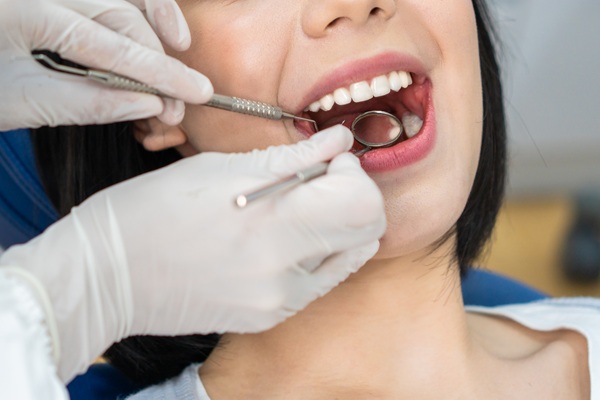What To Do if You Damage a Dental Filling

Dental fillings restore teeth affected by decay, preventing further deterioration and maintaining oral health. However, fillings are not indestructible; they can become damaged due to wear and tear, chewing on hard objects, or trauma. A damaged filling can lead to discomfort, increased sensitivity, and even further tooth decay if left unaddressed. Knowing what to do in the event of a damaged filling can help promote patient comfort and better oral health.
Signs your damaged dental filling needs professional attention
Recognizing the signs of a damaged dental filling as soon as possible can prevent further complications. Like anything else, fillings can become damaged due to normal wear, biting on hard foods, or trauma to the mouth. Here are five signs to look out for:
- Increased tooth sensitivity
- Sharp or jagged edges
- Discomfort or pain
- Visible cracks or missing pieces
- Discoloration around the filling
Should these signs occur, seek prompt, professional care from a general, cosmetic, or family dentist. They can quickly repair or replace the filling to support the smile’s health and strength.
Immediate steps to take after damaging a filling
After noticing a damaged dental filling, take immediate action to protect the tooth and reduce discomfort. For example, rinsing the mouth with warm salt water can clean the area, lowering the risk of infection. Avoid chewing on the affected side until a general, cosmetic, or family dentist examines the tooth. If the filling has completely fallen out, cover the exposed area with dental wax or sugar-free gum to prevent irritation. In addition, stay away from extremely hot, cold, or sugary foods, as exposed tooth structures are more sensitive to temperature changes and bacteria.
Schedule a dental appointment as soon as possible to prevent further damage to the dental filling and smile as a whole. In the meantime, the patient may take over-the-counter pain relievers as directed by the label and their healthcare provider to manage discomfort.
How dentists address damaged dental fillings
A damaged dental filling will typically require either repair or replacement, depending on the extent of the damage and the condition of the surrounding tooth structure. A family, cosmetic, or general dentist will begin by examining the affected tooth and assessing the severity of the damage. In cases where only minor damage is present, a repair may be possible using composite resin to fill small cracks or chips.
However, a full replacement may be necessary if the dental filling is significantly damaged or has completely fallen out. The dentist will remove any remaining fragments of the old filling and thoroughly clean the area to ensure no decay has developed beneath the restoration. A new filling will then be placed to restore the tooth’s function and protect against further issues.
Speak to a dentist today
A damaged dental filling should never be ignored, as it can lead to increased discomfort, decay, and potential complications that require more extensive treatment. Seeking prompt care from a qualified dentist ensures that the affected tooth is properly restored, maintaining both function and appearance. Schedule an appointment with our team at Perry Street Dental today.
Request an appointment here: https://www.mynewnandentist.com or call Perry Street Dental at (770) 400-9933 for an appointment in our Newnan office.
Check out what others are saying about our dental services on Yelp: Composite Fillings in Newnan, GA.
Related Posts
Professional dental care is an important part of keeping your teeth shiny and healthy. However, routine dental care at home can make the results last longer. Daily habits in between regular dental appointments support your long-term oral health and ensure a bright, confident smile.Consistent and effective daily cleaning is a foundation of routine dental care.…
Cosmetic dentistry aims to improve the aesthetics of your smile. It might involve treatments that improve how your teeth appear or treatments that alter the way gum tissues at the base of your teeth look.Cosmetic dentistry often combines various treatments to address all of the issues that negatively impact the appearance of the patient’s teeth.…
Dental veneers enhance the smile with a blend of beauty, efficiency, and durability. These thin shells bond to the front of teeth to correct chips, stains, gaps, and minor misalignment with precision. But like any dental treatment, there are some trade-offs to consider. Weighing the pros and cons of veneers can help patients decide whether…
Thinking about choosing implant-supported dentures to replace your missing teeth? This type of denture offers many benefits, which is why this denture choice has become so popular. However, properly caring for dentures supported by implants is necessary so they will last for many years.While there are many different types of denture choices to choose from,…
